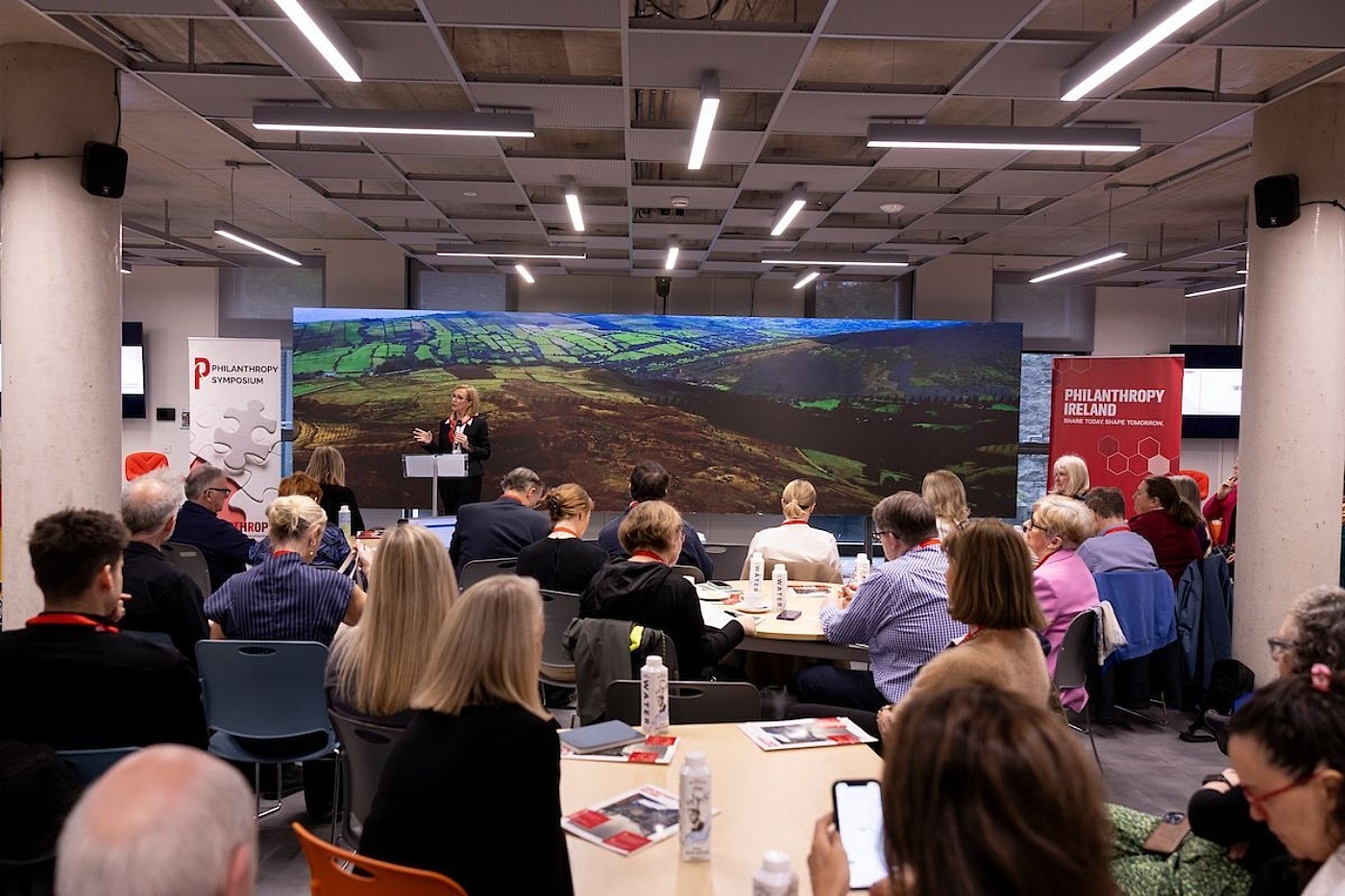
Greater integrity needed in grants assessments
Posted on 24 Nov 2025
The deployment of third-party grant assessors can reduce the risks to funders of corruption,…
Posted on 29 Oct 2025
By Kathy Richardson, SmartyGrants UK

There is not one single way to do philanthropy – everyone can find a place in the evolving ecosystem.
That was one of the themes that emerged during Philanthropy Ireland’s ninth annual symposium, held in Dublin on October 16.
Around 100 members of the Irish philanthropic and not-for-profit communities came together for the conference, which was held at Tangent, Trinity’s Ideas Workspace.
“There is no right way or wrong way to do philanthropy,” Philanthropy Ireland CEO Éilis Murray told the gathering during her summing up at the end of the event.
It was a theme that had also been explored by “next-gen” philanthropists Philip Murphy (Lifes2good Foundation) and Becky Holmes (The Helvellyn Foundation), as well as prominent UK philanthropist Fran Perrin OBE, the founder of the UK’s landmark 360Giving grants data initiative.
“What you can’t do is find the single right way to do philanthropy,” said Perrin, a fifth-generation Sainsbury’s supermarket heir and benefactor.
Perrin told the symposium that having been made aware of her wealth at age 18, she found the world of philanthropy “impossible to navigate” at first. She couldn’t find out who was providing funding in her geographic region, or who was funding the topics she was interested in contributing to.
Her investigations revealed it would be technically easy to compile and share funding data, but difficult to convince philanthropists to contribute their own data to the pot. She set about building and testing a data standard and tool, which became 360Giving, as well as making the case to her philanthropic peers.
Perrin said funders were initially frightened that publicising their work would lead to unwanted press attention, and that they would be bombarded with applications.
In the 10 years since 360Giving was launched, neither fear has eventuated. In fact, “people get slightly fewer but better targeted applications” as a result of being in the database, Perrin said.
More than 300 funders of all sizes and types now provide data to 360Giving, and many use the associated GrantNav tool to find out more about who is funding what in the UK.
Perrin, now a 25-year veteran and shaper of the field, urged those new to philanthropy to find their place in the ecosystem by adopting a learning mindset.
“Learning is the most fun to me but it’s got to be a constant journey,” she said. “You will make so many mistakes, but if you can learn from them, keep learning, you will keep getting better.”
Willingness to learn, as well as willingness to accept a degree of failure and uncertainty about results, were also explored by the co-founder of Long Term Foundation, Tony Gannon, and the health and social care entrepreneur Ed Dunne.
Gannon said he accepted a 15 per cent failure rate for the initiatives he funded, a rate that would not be accepted in business, while Dunne said society’s needs were too great for high-wealth individuals to sit on their hands.
Perrin urged anyone considering working in philanthropy to first gain some experience in the types of organisations they would be seeking to fund (it would make them a better funder, she said), and to seek out “critical challenge” to their strategies and views.
“Nobody will tell you the truth when you’re holding the chequebook,” she warned.
“Nobody will tell you the truth when you’re holding the chequebook."
Collaboration was another key theme of the symposium, with Éilis Murphy reminding delegates that working together was most effective when it was for a clear purpose.
Speakers pointed out that it was crucial to have a person or organisation assigned to a coordination role, and for partners to acknowledge that collaboration would require additional work.
Symposium delegates also had the opportunity to consider the wider landscape in relation to their contribution to the ecosystem, and they were challenged to examine entrenched beliefs that help shape funding strategies.
Ireland was a rich country that considered itself poor, and an urban country that considered itself rural, said Michael McLoughlin, CEO of Amárach Research. Private wealth in Ireland could and should be harnessed for the public good, he said.
Perrin urged the philanthropic sector to embrace the initiatives and reforms being led by Philanthropy Ireland, and to consider initiating their own.
“If you think ‘Why don’t we have x in Ireland?’ – build it,” she said.
An overview of a study undertaken by Philanthropy Ireland revealed to delegates the current state and trajectory of the Irish philanthropic community. The snapshot study suggests key levers for growth to unlock philanthropy:
The Impact Map overview, which was presented at the Philanthropy Ireland conference by Head of Communications and Relationships Hazel Hennessy
Delegates were also offered a perspective on how Irish philanthropy compared with the scene in Australia, with visiting speaker Krystian Seibert, the executive director of policy and sector development at Philanthropy Australia, providing some comparisons and contrasts.
Private ancillary funds (PAFs), which were introduced in Australia in 2001 to provide a tax-efficient vehicle for channelling wealth into giving, proved to be of particular interest to those considering how government might do more to support the growth of philanthropy in Ireland.
For more information about Philanthropy Ireland events visit https://www.philanthropy.ie/
To download the full conference report visit https://www.philanthropysymposium.ie/resources

Posted on 24 Nov 2025
The deployment of third-party grant assessors can reduce the risks to funders of corruption,…

Posted on 29 Oct 2025
There is not one single way to do philanthropy – everyone can find a place in the evolving…

Posted on 29 Oct 2025
A UK charity has moved to reduce wasted effort by grantseekers by allowing for more informal…

Posted on 20 Oct 2025
Charities risk being cut out of vital relationships with their beneficiaries and donors as…

Posted on 23 Jun 2025
Fragmented data systems, inconsistent wellbeing metrics, and pressure from central government…

Posted on 15 May 2025
SmartyGrants UK is pleased to announce two new collaborations that further our commitment to…

Posted on 05 May 2025
SmartyGrants has released a new embedded reporting tool designed to strengthen grantmakers’ ability…

Posted on 01 May 2025
A UK foundation rating system offers valuable insights into how grantmakers around the world can…

Posted on 01 May 2025
With the charities sector juggling restricted grants, tight timelines, and a must-succeed…

Posted on 13 Mar 2025
In a February 2025 piece, Maria Chertok and Chandrika Sahai say there's a growing awareness within…

Posted on 10 Mar 2025
Signing on a £1 million (AU$1.93 million) grants program celebrating maritime histories around the…

Posted on 10 Mar 2025
Adam Ognall, executive director of partnerships and practice at Philanthropy Australia, considers…